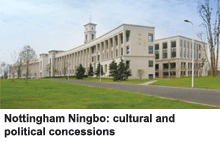When the University of Nottingham opened its campus in Ningbo, China in 2005, it was hailed as a little piece of England in a foreign field, with its British curriculum, English-only tutorials and replica of the Nottingham campus’ tower, complete with chiming bells. Unlike other Sino-British university collaborations, Ningbo, or UNNC as it is known internationally, is not a partnership with a Chinese institution. Nottingham’s partner in the venture is a private company, the Wanli Education Group, an arrangement designed to leave the institution free to run its academic affairs on Western liberal lines.
 Nottingham has been keen to emphasise this freedom, describing Ningbo as the “first and only Western university to operate independently from the Chinese government”. Yet on closer examination, it is clear that it has had to make significant concessions to the cultural and political parameters within which it is operating.
Nottingham has been keen to emphasise this freedom, describing Ningbo as the “first and only Western university to operate independently from the Chinese government”. Yet on closer examination, it is clear that it has had to make significant concessions to the cultural and political parameters within which it is operating.
For example, the university is responsible for enforcing laws forbidding the dissemination of anti-government material. Student-residence regulations posted on UNNC’s website say that “distributing any anti-government materials is strictly forbidden”, adding that any breach of this rule is punishable under the university’s disciplinary code. Roger Woods, Ningbo’s outgoing provost, told Times Higher Education that the university is required by Chinese law to include the paragraph in its regulations. However, he added that UNNC has never required to enforce the rule.
Another conspicuous difference between Nottingham’s UK and Chinese campuses is the Communist Party branch office at UNNC. According to the campus’ website, Lu Junsheng, deputy party secretary of the local Chinese Communist Party Committee branch, is in charge of “the political and ideological education of the students”.
However, a spokesman for Nottingham says this is a reference to compulsory courses in Chinese history, politics and culture taught to all domestic first-year students, and do not form part of the Nottingham degree programme. “The UNNC programmes are completely separate and have the same content as Nottingham’s UK degrees. There is no Communist Party involvement in what is taught in these programmes,” he says.
However, Prof. Woods acknowledges that the description of the university as independent of government is not quite the right way to put it. “We’re here with the support and approval of the Chinese government and we couldn’t manage without it. The university accepted the residence regulations and the Communist Party’s presence on campus as part of the deal when it set up shop in China,” he explains.
(Excerpted and adapted from Times Higher Education)